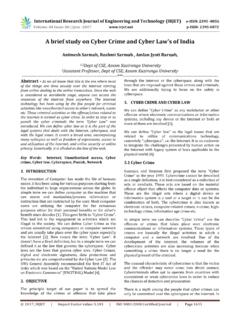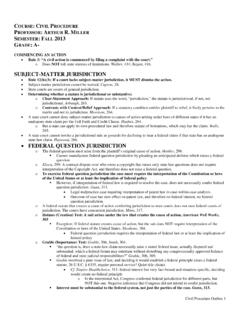Transcription of Ethics of Hacking Back
1 Ethics of Hacking Back Six arguments from armed conflict to zombies A policy paper on cybersecurity Funded by: National Science Foundation Prepared by: Patrick Lin, PhD California Polytechnic State University Ethics + Emerging Sciences Group San Luis Obispo, California Prepared on: 26 September 2016 Version: Index Abstract 1 Acknowledgements 1 1. Introduction 2 What is Hacking back? 3 What is the controversy? 4 2. Six arguments 7 Argument from the rule of law 8 Argument from self-defense 10 Argument from attribution 12 Argument from escalation 14 Argument from public health 19 Argument from practical effects 21 3. Conclusion 24 4. Endnotes 25 About the author 341 E t h i c s o f H a c k i n g B a c k : S i x A r g u m e n t s f r o m A r m e d C o n f l i c t t o Z o m b i e s Copyright 2016 Patrick Lin, Ethics + Emerging Sciences Group Abstract It is widely believed that a cyberattack victim should not hack back against attackers.
2 Among the chief worries are that Hacking back is (probably) illegal and immoral; and if it targets foreign networks, then it may spark a cyberwar between states. However, these worries are largely taken for granted: they are asserted without much argument, without considering the possibility that Hacking back could ever be justified. This policy paper offers both the case for and against Hacking back examining six core arguments to more carefully consider the practice. Acknowledgements This policy paper has benefited from reviews by and conversations with Duncan Hollis, Heather Roff, Fritz Allhoff, Keith Abney, Rob Morgus, Peter Singer, and others. This research is supported by National Science Foundation grant #1318126. Any opinions, findings, and conclusions or recommendations expressed in this material are those of the author and do not necessarily reflect the views of the persons or organizations above.
3 2 E t h i c s o f H a c k i n g B a c k : S i x A r g u m e n t s f r o m A r m e d C o n f l i c t t o Z o m b i e s Copyright 2016 Patrick Lin, Ethics + Emerging Sciences Group 01 Introduction In cybersecurity, there s a certain sense of helplessness you are mostly on your own. You are often the first and last line of defense for your information and communications technologies; there is no equivalent of state-protected borders, neighborhood police patrols, and other public protections in cyberspace. For instance, if your computer were hit by ransomware malware that locks up your system until you pay a fee to extortionists law enforcement would likely be unable to help The Federal Bureau of Investigation (FBI) offers this guidance: To be honest, we often advise people to just pay the ransom, according to Joseph Bonavolonta, the Assistant Special Agent in Charge of the FBI s CYBER and Counterintelligence Do not expect a digital cavalry to come to your rescue in time.
4 As online life moves at digital speeds, law enforcement and state responses are often too slow to protect, prosecute, or deter cyberattackers. To be sure, some prosecutions are happening but inconsistently and slowly. The major cases that make headlines are conspicuously unresolved, even if authorities confidently say they know who did them. Take, for example, the 2015 data breach at Office of Personnel Management: personnel records for more than 20 million federal workers were stolen, including sensitive background information for security clearances. Or think of any number of high-profile incidents. For the most part, there have been no arrests, no prosecution, no restitution in essence, no satisfaction or justice for victims. In that vacuum, it is no wonder that self-help by way of Hacking back has been gaining Hacking back is a digital counterstrike against one s cyberattackers. Where law enforcement would warn us to not chase down a robber or retaliate against a criminal gang in the physical world, they naturally reject Hacking back as a sound strategy in the cyber world.
5 But what exactly is the case against Hacking back? While the question appears in the media, actual sustained arguments are hard to find. It is supposed to be obvious that civil society should reject the practice as illegal and unethical. This policy paper will explore both the general case for and against Hacking back. This is important, since more response-options are needed to deal with growing threats. 3 E t h i c s o f H a c k i n g B a c k : S i x A r g u m e n t s f r o m A r m e d C o n f l i c t t o Z o m b i e s Copyright 2016 Patrick Lin, Ethics + Emerging Sciences Group Without laying out the arguments, critics could be ruling out the option too quickly. I will focus on general arguments, because the specific context may make a difference in judging particular cases. For example, it matters whether a cyber counterstrike is proportionate, discriminate, and safeguarded against excessive collateral If it is not, then it may be immediately unethical, if not illegal .
6 This paper will also focus primarily on Ethics . While the legal risks are large, the law is still unsettled, as there has not been a clear test-case for Hacking back yet. When the law is unclear and needs to be clarified, it is useful to return to Ethics to go back to first principles to help guide the law s evolution. This general Ethics discussion, then, sets the stage for further conversations about law and policy, which are separate but related issues. If Hacking back is generally unethical, that may make conversations about wisdom and legality moot. But if it is not clearly unethical, the wisdom and legality of the practice can be a productive study. What is Hacking back? Hacking back sometimes goes by the euphemism of active cyber defense. 5 The idea is to emphasize that this kind of Hacking is not an unprovoked first strike but a counter-response to an attack, in case there is an ethical and legal difference between first and second strikes.
7 But Hacking back, even if defensive, is offensive in nature: it is a directed attack back at an aggressor, not just a protective block. If defense against an attack is holding up a shield, then active defense is wielding that shield as a weapon to harm, not only to absorb an attack. So, the euphemism is a bit of a misnomer and blurs the lines between offensive and defensive measures, in case there is an ethical and legal difference between those as well. Hacking back can take many forms, nearly as diverse as Hacking in the first place. An organization, for example, can collect information or trace the theft back to a particular system, that is, attribute the attack to a perpetrator. It can even take a next step of breaking in to delete or retrieve the stolen data. It can also activate the attacker s webcam and send back photos for evidence. Alternatively, the hack-back can be more serious, such as embedding your sensitive data with malicious code that locks down a cyber-thief s computer, as ransomware does.
8 It can also corrupt the system files of a computer or network to make it permanently inoperable. Because there are many ways you could hack back, they involve different levels of harm, from privacy intrusions to data breaches to physical damage. It also may matter who does the Hacking back: a private individual who hacks back without the approval of law enforcement is more troubling than a state that hacks back on behalf of a victim. Therefore, some forms of counterattacking may be more problematic than others. In this report, by cyberattacks , I mean those that threaten confidentiality, integrity, or availability of a system serious attacks that 4 E t h i c s o f H a c k i n g B a c k : S i x A r g u m e n t s f r o m A r m e d C o n f l i c t t o Z o m b i e s Copyright 2016 Patrick Lin, Ethics + Emerging Sciences Group would qualify as computer crimes and acts of Hacking .
9 In contrast, verbal attacks or defamation by electronic means are not cyberattacks in this paper. Cyberattacks also do not have to be harmful per se, but they at least commit wrongs. For instance, an unauthorized peek at your online diary might not harm you, but you were still wronged when your privacy was violated. For this policy paper, I will have the hard cases in mind, such as hack-backs by private actors that do physical damage without much provocation; for instance, if the initial cyberattack had only shut down access to a non-critical website for even just a few minutes. If those cases are not generally unethical, then neither are the less troubling cases. What is the controversy? Unclear legal status is the root of Hacking back s controversy. It is probably illegal , as news reporting usually Looking at the as an example, the Department of Justice calls it likely illegal in its latest advisory for victims of The FBI cautions victims against Hacking back but stops short of forbidding At the highest level of government, White House officials call Hacking back a terrible idea.
10 9 The same laws that make it illegal to hack in the first place for instance, to access someone else s system without authorization presumably make it illegal to hack back. In the , the Computer Fraud and Abuse Act and Wiretap Act are among the key pieces in this patchwork of law. Foreign laws may be violated, too, such as the Computer Misuse Act and Data Protection Act in the ; and the Budapest Convention on Cybercrime attempts to harmonize these and other such laws internationally. However, these laws were not written with Hacking back in mind: they do not consider Hacking back, as distinct from unprovoked or standalone Hacking more generally, and there is not yet a clear test-case to settle the question of whether or not the practice is legal. One reason for the lack of a test-case is a lack of prosecution of those who hack back, in any of the forms it may take. If initial cyberattacks are difficult to attribute or prosecute, then so are counterattacks.




